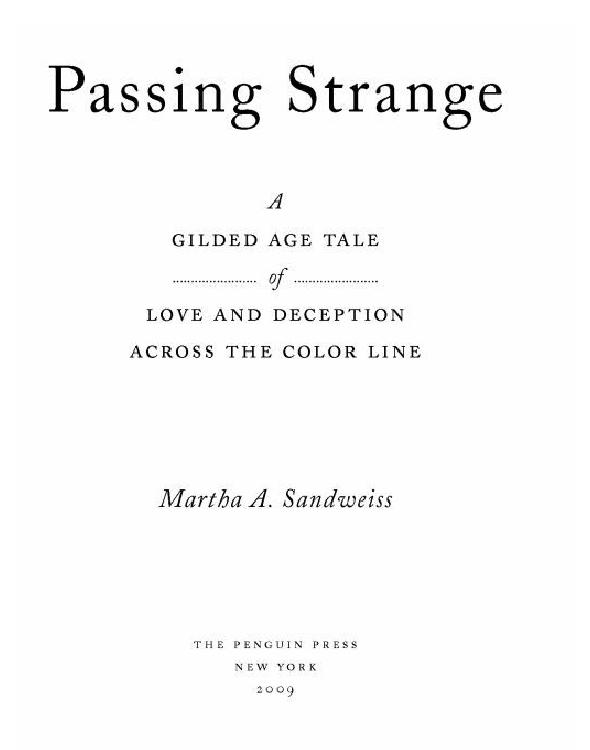
Passing Strange
A Gilded Age Tale of Love and Deception Across the Color Line
کتاب های مرتبط
- اطلاعات
- نقد و بررسی
- دیدگاه کاربران
نقد و بررسی

Starred review from December 1, 2008
Sandweiss (Print the Legend
) serves a delicious brew of public accomplishment and domestic intrigue in this dual biography of the geologist-explorer Clarence King (1842–1901) and Ada Copeland (c. 1861–1964), a “black, working-class woman” who was “born a slave.” Rendered as fiction, this true tale, would seem quite implausible—“a model son of Newport and one of the most admired scientists in America,” Clarence kept secret for 13 years his marriage to Ada and their apparently contented domestic life. He kept his patrician past and celebrated present concealed as well from his wife, who believed herself the wife of James Todd, a black Pullman porter. Sandweiss provides a fascinating account of King's “extraordinary double life as an eminent white scientist and a black workingman”; Ada's struggle “through the legal system to assert her rightful name, give her children their true familial history, and claim the trust fund she believed to be hers”; and rich insights into the “distinctive American ideas about race” that allowed King to “pass the other way across the color line, claiming African ancestry when he had none at all.”

January 15, 2009
American West historian Sandweiss (American studies & history, Amherst Coll.; "Print the Legend") utilizes archival, newspaper, and a panoply of digitized resources to analyze the personal and social complexity of the life of noted surveyor and geologist Clarence King (18421901). King, the scion of a storied white New England family, passed as the purported Pullman porter James Todd in order to espouse his African American common-law wife, Ada Copeland Todd King. Unlike previous King biographers (e.g., Robert Wilson, "The Explorer King"), Sandweiss treats in detail the challenges and dilemmas that King confronted in post-Civil War America, even in relatively tolerant New York City. Balancing scholarly exploration with readability, she focuses on King's 13-year secret (until he was on his deathbed, King kept the fact of his actual race from his wife), which produced acute psychological strains. History learned of it with a legal claim for his trust fund in 1933. Sandweiss demonstrates just how racial identity and inequality circumscribes behavior, adding both general background and individual perspectives on the conundrum of race in America. Her literary references add to a historical narrative that should catch the attention of both specialists and the reading public. A welcome choice for both academic and public libraries.Frederick J. Augustyn Jr., Library of Congress
Copyright 2009 Library Journal, LLC Used with permission.

February 1, 2009
During Americas Gilded Age, Clarence King was a famous geologist, friend of wealthy, famous, and powerful men. He was a larger-than-life character whose intellect and wanderlust pushed him to survey far-flung regions of the western U.S. and South America and develop an abiding appreciation of non-Western culture and people. What his family and wealthy friends did not know was that for 17 years, King lived secretly as James Todd, a black Pullman porterwitha black wife and mixed-race children residing in Brooklyn.Devotedto his mother andhalf-siblings, restless and constantly in need of money, King relied on the largesse of his wealthy friends to help him support both families, never revealing his secret until he was near death. Sandweiss relies on letters, newspaper accounts, and interviews to chronicle the extraordinary story of an influential blue-eyed white man who passed for black at a time when passing generally went the other way.An engaging portrait of a man who defied social conventions but could not face up to the potential ruin of an interracial marriage.(Reprinted with permission of Booklist, copyright 2009, American Library Association.)

























دیدگاه کاربران